CHAPTER 1
THE PROBLEM AND ITS BACKGROUND
Introduction
The development of a child is a product of the parents’ way of guidance, discipline, and encouragement. Parenting enables students to function and practice maturity, as they engage themselves in everyday tasks and responsibilities as senior high students preparing for the future.
Based on a study by Kilonzo (2017), parents play a crucial role for their children’s development. A child’s personality dimensions such as self-efficacy, self-esteem, and identity development are from the influence of their parents.
Additionally, a study by Metwally (2018) showed the results of the correlation of different parenting styles with different personality traits. Permissive parenting correlates with openness personality traits while Authoritarian parenting shows positive correlation with neuroticism, but negatively correlates with agreeableness, conscientiousness, and openness. Authoritative parenting has the most significant result than the other two as it positively correlates with all of the personality traits mentioned. Therefore, Authoritative parenting style can provide a positive influence for the improvement of the students.
Researchers at Nasugbu East Senior High School aims to assess the impacts of the parenting styles, and how helpful its influences on Grade 11 Humanities and Social Sciences students. The researchers also seek a program that should be developed as it can help to improve the students’ personality development.
Background of the Study
Parents can have various factors from their own development that may affect their way of parenting. According to a study by Lang and Diener (2020), parents are influenced by their own parents, gathering strategies that they might use for their child’s development. Parenting styles may rely on the parents’ acquired personality and qualities, affecting the way they support and respond to their child. Sociocultural factors such as economic struggles, religious beliefs, politics, and institutions may also influence parenting. Because of these factors, it may be applicable for the parents to teach their experiences to build up their child’s beliefs and values.
Different personality styles can affect a child differently. A study by Zheng (2023) shows that behaving authoritatively may lead to beneficial qualities and lesser behavioral issues, unlike authoritarian and permissive that have the tendency to cause maladaptive personalities and performance that can affect the child negatively.
With the gathered data, the researchers applied the use of descriptive research design to assess the Impact of Parenting Styles on Personality Development of Grade 11 HUMSS Students at Nasugbu East Senior High School. The findings will serve as the basis for the proposed educational program to improve student’s personality development that will contribute to a deeper understanding of the subject.
Statement of the Problem
This study aimed to assess the Impact of Parenting Styles on Personality Development of Grade 11 HUMSS Students at Nasugbu East Senior High School, Brgy. Lumbangan, Nasugbu, Batangas, Academic Year of 2024-2025.
Specifically, the study sought answers to the following questions:
1. How does authoritative parenting influence students’ self-perception and confidence?
2. How do different parenting styles affect social skills of HUMSS students?
3. What program should be developed relying on parenting styles to improve student’s personality development?
Scope and Limitations of the Study
The study is focused on assessing the Impact of Parenting Styles on Personality Development of Grade 11 Humanities and Social Sciences at Nasugbu East Senior High School, Barangay Lumbangan, Nasugbu, Batangas. The study was limited only to Humanities and Social Sciences from the school. The information was solely gathered from the respondents’ answers in the survey questionnaire. The findings were the bases for the proposed educational program for students that will contribute to a deeper understanding of the subject.
Definition of Terms
These are the conceptual and operational definitions of the following words and phrases used in this study for clearer understanding of the research:
Authoritative Parenting. This parenting nurtures, responds, and supports the child but it sets firm limits for them. It is an attempt to control children's behavior by explaining rules, discussing, and reasoning. Parents listen to the viewpoint of their child but for some instances, they don't always accept it (American Psychological Association, 2017). In this study, it refers to the parent’s way of setting reasonable limitations for their child. The parents' attentiveness is always on their child for support. But not all the time they would agree to what their child would do or say, as this controls their behavior.
Permissive Parenting. This parenting usually has minimal expectations for their child. Limited rules are imposed on the child as the parents give space for them to figure things out on their own. It encourages open communication and acts more like friends than parents (Sanvictores and Mendez, 2022). In this study, it refers to the approachableness of both parents and their child. The parents do not put too many expectations and rules to their child as they allow them to explore and learn things at their own hands.
Authoritarian Parenting. This parenting is extremely strict as it expects the child to follow rules without discussion or compromising. Parents are not that affectionate of their child, as it does not believe in positive parenting. They use this approach for many reasons such as nationality, culture, or ethical backgrounds (Trautner, 2017). In this study, it refers to the pressuring and strict approach of the parents towards their child. Rules must be followed by their child without any more explanations. This style might be from the parent's experienced culture and nationality as they grow up.
Maladaptive Personality. These are the actions or behaviors that are unhelpful or counterproductive in achieving goals or maintaining our well-being. This can cause dysfunction or not having healthy relationships with other people, as this only leads to distress, anxiety or difficulties in our daily lives (Wright, 2024). In this study, it refers to the negative way of living and actions that can be deteriorating to one's life. This is the effect of negative parenting that causes the child to struggle with functions and relationships, and even mental challenges.
Neuroticism. It is a personality trait that is characterized by emotional instability, irritability, anxiety, self-doubt, and depression. It can affect relationships negatively, and can cause trouble dealing with stress (Cuncic, 2023). In this study, it refers to the inability to deal with destructive behaviors that are caused by the child’s experience from their parents’ way of parenting, mostly the authoritarian parenting style. Because of these negative personality traits, it can deteriorate their daily life.
Conscientiousness. Conscientiousness is a personality trait that includes being diligent, responsible, and careful. They can apply self-discipline, and rarely make impulsive or careless decisions in their lives for them to meet their goals (Gordon, 2023). In this study, it refers to being goal-oriented and being able to get their life put altogether by refraining from bad choices. Conscientiousness is evident to a child’s life if their parents apply authoritative parenting throughout their growth.
Openness. Openness is the ability of a person to be imaginative, creative and insightful around their surroundings and interactions. Open minded people seek new experiences, ideas, and prefer to have variety (Johns, 2024). In this study, it refers to being curious to learn all things and to explore them as children are curious and imaginative. This trait can be rooted in parents who use authoritative or permissive style to their children.
Agreeableness. Agreeableness is identified as being selfless, appreciative, accepting, trusting, and kind towards people. People with this personality trait are known as sympathetic and tender-minded (Furnham, 2017). In this study, it refers to being a positive influence of a child towards the people that they meet in school, or any environment they are in. Children who possess this behavior are most likely to be experiencing a positive way of parenting.
Self-efficacy. It is being able to trust your abilities and yourself. It is the confidence that we must achieve a desired goal and standard, Maintaining a goal-oriented and positive mindset (Gillette, 2024). In this study, it refers to having a positive mindset and the ability of a child to perform them without any doubts. It focuses on how optimistic a child is while working on how they will achieve the outcome that they want.
Personality Development. Personal development is the process of growth and enhancement of one's personality traits over time. It can occur naturally through experiences, but it can be also from intentional efforts (Cherry, 2023). In this study, it refers to the development and change of an individual's personality through occurrences, or through the influences from their parents relying on the parenting style applied to them.
Significance of the Study
The results and findings of this study entitled “Assessing the Impact of Parenting Styles on Personality Development of Grade 11 HUMSS Students” are significant and beneficial to various stakeholders:
Students: This study will serve as a enlightenment for senior high school students as they gather insights into how different parenting styles impact their personality development as they build up their self-perception, confidence, and social skills as individuals.
Faculty Members: This study enables them to understand the causes of their students’ behaviors at school, to look for effective and supportive strategies that will help and improve their personality development.
School Head/Administrator: The findings of the study give them significant information that they can use for planning strategies that aim for the betterment of the students’ personality development and to foster an environment that supports their growth.
Parents: This study will help them to understand how their method or style of parenting affects their child and its impact on their personality development. The gathered insights will enable them to build up and adapt an effective parenting style for their child.
Future Researchers: This study will serve as a valid reference for future studies. This will benefit them in assessing the impacts of parenting styles and why does it affect a student’s personality development as a learner in senior high school.
CHAPTER 2
REVIEW OF RELATED LITERATURE
Authoritative Parenting influence on student’s self-perception and confidence
According to a study conducted by Aziz et al., (2021), the findings revealed that both authoritative and permissive parenting fosters a positive influence on self-esteem; unlike authoritarian parenting that can cause negative influences on children. The study also garnered that peer attachment also has a supportive impact on a child's confidence, as they are also a source of affirmation and assurance aside from their parents.
Another study by Garcia and Santiago (2017), the results showed that authoritative parenting is the most practiced style towards adolescents. Parents who are authoritative act as a role model for their child, as well as allowing them to act independently. This teaches the child that they are competent attaining accomplishments on their own, helping them to build a strong self-esteem and confidence. The study also highlights the importance of parents giving rules and regulations, but also the freedom for their child to stand for their own decisions in life is still vital for their growth as an individual.
A study by Sembiring et al., (2023), shows that adolescents raised under the authoritative parenting style experience high warmth and expectations. These have been repeatedly linked to advantageous emotional outcomes for them. It emphasizes the importance of disciplinary but supportive parenting to build psychological health and emotional resilience, attaining a strong self-perception and the ability of confidence towards life encounters.
Moreover, a study by Rao and Wang (2023), shows that the increasing proportion of authoritative parenting gives positive emotional support to children, enhancing their self-efficacy in learning new things. It provides guidance that helps children to recognize themselves, establishing an appropriate self-concept at an early age.
Additionally, Yaoyao et al., (2024), shows that the findings that authoritative parenting style, which is known for its kindness, responsiveness, and support for autonomy; fosters the development of strong emotional relations and the cultivation of independence in adolescents.
Different parenting styles affecting the social skills of HUMSS students
According to a study by Nderitu (2018), children that experience neglect from their parents display poor interpersonal relationships, low self-esteem, and may develop antisocial behaviors due to lack of parental support, mentorship, and limited communication that may lead to dysfunction. Hence, it is recommended that parents should practice and embrace warm and positive parenting. Through this, the child may engage themselves in peer relations, attain emotional stability, and foster a sense of morality. Parents should also adopt strategies that monitor and regulate their child's actions without harming their self-esteem, communication and collaborative skills.
Another study by Rekha (2020), by gathering findings about the two-parenting style, it is very evident that authoritative parenting is superior because it guarantees that a child will be able to learn collaboration. Because of severe and strict conditions, authoritarian parenting is not advisable as this can cause negative influences on the child.
A study by Bahreini et at., (2020), showed findings that authoritative parenting, with its way of maintaining limitations for discipline, interaction and intimacy, may lead to appropriate levels of independence and the practice of two-way communication between the parent and the child. This may improve the child’s social skills as this shapes them to be communicable with others and maintain relationships.
Based on a study by Sitorus and Nurhafizah (2023), social skills of a child developed from an early age will help them to acquire a rational way of thinking process, which enables them to make good decisions in life for the future. Family factors may affect the child’s way of socializing with others, as it affects their self-esteem and may attain personality traits; whether it may be from positive or negative influences.
Additionally, a study by Seyrdowleh et al., (2021), states that a child’s personality is from the attitudes, assumptions and family behaviors. Aside from authoritative, authoritarian parenting style influences the child to be obedient but may lack social skills because of its negativity, that may influence the child to have low self-esteem. This parenting may cause antipathy and hostility between the relationship of the parent and the child, which creates hindrances that can affect a person’s life.
Permissive parenting, on a study by Mahapatra and Batul (2016), parents allow their child to have freedom and autonomy. Permissive parents tend to rely on reasoning and explanation, and do not enforce their child with demands. They are highly responsive to their child’s wants and needs, which may lead to a lack of self-reliance that can cause difficulties in forming relationships.
Theoretical Framework
This study was anchored on the Parenting Style Theory by Diana Baumrind (1971) as cited by Kuppens and Ceulemans (2019). This theory introduced a typology with three parenting styles that describes their differences in control and response to children: authoritarian, authoritative, and permissive parenting.
Baumrind’s Parenting Style Theory suggested that these three parenting styles are different via response and control towards children. Authoritarian parents use an absolute set of standards to evaluate, shape and control their child’s behavior. Permissive parents tend to be warmer and grants autonomy rather than enforcing control. Baumrind considered that Authoritative falls in between those two parenting styles as this style of parenting can be responsive but put restrictions to children for discipline. It also allows autonomy just like permissive parenting, but the difference is they only give their child some room to practice it.
The theoretical perspective is applicable in the present study as it suggests parenting styles that have different influences and impact on children. The interconnectedness of this concept linked the Personality Development of Grade 11 HUMSS students at Nasugbu East Senior High School relative to their self-perception, confidence and social skills.
Moreover, acknowledging the importance of this theory would strengthen the crafting of learning materials to develop that will inform students about the impacts of parenting styles on their personality development as it will provide substantial parameters for inputs in its realization.
Conceptual Framework
Based on the conceptual theory used in this study, the researcher found out that to make depth knowledge and careful judgement about the relationship of variables, it required critical analysis of the variables that can improve the personality development of students as well as assessing the impacts of parenting styles used by parents.
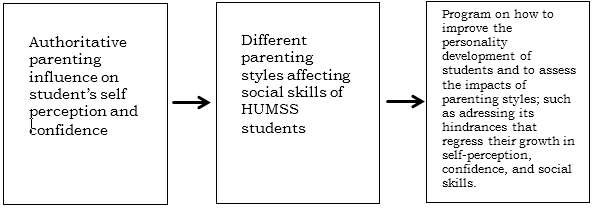
Figure (1) illustrates the study’s research simulacrum. It shows the relationship of Parenting styles (Authoritative, Authoritarian, and Permissive parenting) and the Personality development of Grade 11 HUMSS students. Thus, the impact of the variables is determined. This study assesses the impact of Parenting styles on Personality development of Grade 11 HUMSS students in Nasugbu East Senior High School.
CHAPTER 3
RESEARCH METHODS AND PROCEDURES
This chapter presents the methods of research used. It also includes research design, locale and respondents of the study, research instrument, construction and validation of instrument, ethical considerations, data gathering procedures and statistical treatment of data.
Research Design
The study used the descriptive research design to assess the impact of Parenting styles on Personality Development of Grade 11 Humanities and Social Sciences students of Nasugbu East Senior High School. Based on Dovetail (2023), descriptive research enables researchers to precisely and methodically explore; and describe a population, circumstance or phenomenon. In descriptive research, findings can be reported through surveys, observational studies, and case studies. In this study, the method was utilized by obtaining information or data of Speculative Assertion of Grade 11 Students in terms of decision making, planning strategy, evidence-based analysis, problem solving, communication with the result and feedback mechanism. The variables were included in the research as it was deemed significant to the present study.
Locale of the Study
The study was conducted in Nasugbu East Senior High School located at Brgy. Lumbangan, Nasugbu, Batangas. It was founded in the year 2016. The school was headed by Principal II, with fifty-one (51) teachers and four (4) non-teaching staff. It has a total population of one thouasand three hundred eighty-four (1,384) enrolled students comprises the grades 11 and 12. There is total (339) population of Grade 11 Humanities and Social Sciences this school year 2024-2024. The school offers academics which includes Accountancy, Business and Management (ABM) strand, Humanities and Social Sciences (HUMSS) strand, Science, Technology, Engineering and Mathematics (STEM) strand, and Technical, Vocational, and Livelihood Track (TVL).
Respondents of the Study
The researcher used Slovin’s Formula in computing the sample size population. Slovin’s formula is used to calculate the sample size necessary to achieve a certain confidence interval when sampling a population. Hence, the sample size recommended using this formula was one hundred eighty-three (183) respondents with confidence level of 95 percent and Precision Level or margin of error of 5 percent. The sampling was applicable in the present study to represent the target population. After thorough study of the problem, the respondents were chosen using Simple Random Sampling (SRS) which involves selecting individuals from the population in such a way that every individual has an equal chance of being chosen. This sampling method has an equal and likely possibility of getting selected in the sample. Since the selection of item completely depends on the possibility, therefore this method is called “Method of chance selection”.
Research Instrument
The researcher reviewed various literature in speculative assertion to construct the instruments of the study. A survey questionnaire was developed from these literatures and was utilized to gather pertinent data for the present research.
Part I - Authoritative parenting influences a student’s self-perception and confidence
Part II - Different parenting styles affecting social skills of HUMSS students. It was rated on a 4-point Likert scale as follows: 4--Strongly Agree, 3--Agree, 2--Disagree, 1--Strongly Disagree.
Construction, and Validation of the Instrument
The research instrument was constructed under the expert guidance of the thesis adviser. For the several items we asked our expert people who knew a lot about the question until they were just right. Then after the revised we sent our questions to other advisers for the advice and kept changing the real measure of what we wanted to know. This helped us to make sure our questions are out of education. They looked at each item to check if they were valid and our study would give us the right answer and good feedback. Additionally, this process of construction and validation of the instruments is to ensure that the research instruments are both reliable and valid.
Ethical Considerations
Part of the ethical Consideration of this study was to secure the consent of the Respondents to voluntarily participate. Before the respondents participated in this study each participant was given a copy of the consents. The researcher made sure that the consent was carefully explained to each respondent. It was further emphasized to the respondents that participation in the study was voluntary and that they have the option not to participate in the study. Ethical principles were considered to preserve the integrity and dignity of the respondents.
Data Gathering Procedure
The school principal of Nasugbu East Senior High School and public-school district supervisor granted permission for the researcher to conduct this study prior to the distribution of the questionnaires. The request letter (Appendix A) was forwarded to the Office of the School Principal. Following the approval, the researcher informed the respondents of the research's goal before the survey and allowed for questions to address any concerns. Then the researcher gave the survey questionnaires to the study's target respondents, giving them plenty of time to complete them. In addition, the research sought the assistance of respondents to be able to honestly assess their Speculative Assertions. The accomplished survey questionnaire was checked by the researcher for completion of the respondents before retrieval.
Statistical Treatment of Data
The following were the statistical tools used in the study:
Problem 1: How does authoritative parenting style influence student’s self-perception and confidence
Problem 2: How does different parenting styles affect social skills of HUMSS students?
Problem 3: Challenges Encountered by the Respondents: To identify the challenges encountered by the respondents by a survey questionnaire both online and face to face surveys.
CHAPTER 4
PRESENTATION, ANALYSIS, AND INTERPRETATION OF DATA
This part presents the data gathered, analyses and interpretation to answer the problem which this study aims to achieve.
1. Influence of Authoritative Parenting on Student’s Self-Perception and Confidence.
Table 1 presents the Influence of Authoritative Parenting on Student’s Self-Perception and Confidence. Based on the ten (10) indicators which are presented to the respondents during the conduct of the survey, the highest Weighted Mean is the respondents’ answers regarding children’s confidence in their abilities to tackle new challenges with the support of their parents; with weighted mean of 3.44 (SD=2.91), qualitatively describes as Agree.
This means that they are getting the support they need from their parents to gain confidence to tackle life’s challenges. However, motivation to achieve goals because of high but achievable expectations from the parents has the lowest weighted mean of 3.03 (SD=2.63) which means students appreciate the topics. This indicator is qualitatively described as Agree.
Overall results show that the respondents mark “agree” on their authoritative parenting on student’s self-perception and confidence with grand weighted mean of 3.15 (SD=2.72).
This result is related to the study conducted by Sembiring et al., (2023), revealed that adolescents raised under the authoritative parenting style experience high warmth and expectations. These have been repeatedly linked to advantageous emotional outcomes for them. It emphasizes the importance of disciplinary but supportive parenting to build psychological health and emotional resilience, attaining a strong self-perception and the ability of confidence towards life encounters.
Table 1 Influence of Authoritative Parenting on Student’s Self-Perception and Confidence
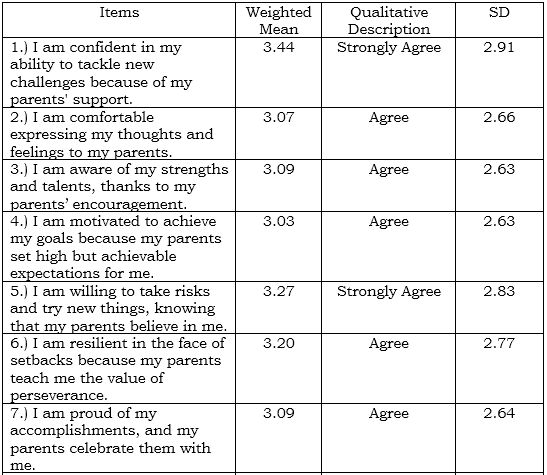
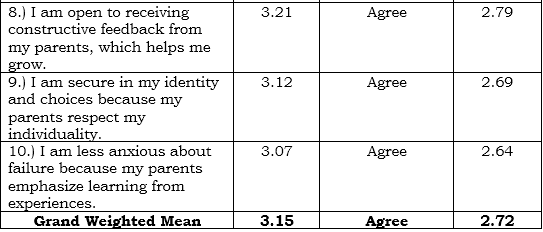
Legend: 1.00-1.49 strongly Disagree, 1.50-2.49 Disagree, 2.50-3.49 Agree, 3.50-4.00 Strongly Agree, SD-Standard Deviation
2. Different Parenting Styles on Social Skills of HUMSS Students.
Table 2 presents the Different Parenting Styles on Social Skills of HUMSS Students. Based on the nine (9) indicators which are presented to the respondents during the conduct of the survey, the highest Weighted Mean is the respondents’ answers regarding the children’s comfortability in making new friends as they are encouraged by their parents to socially interact; with weighted mean of 3.28 (SD=2.83), qualitatively describes as Agree.
This means that they are getting the support they need from their parents to gain confidence to tackle life’s challenges. However, good expression of feelings that are learned by parents’ open communication has the lowest weighted mean of 3.10 (SD=2.68) which means students appreciate the topics. This indicator is qualitatively described as Agree.
Overall results show that the respondents mark “agree” on their authoritative parenting on student’s self-perception and confidence with grand weighted mean of 3.15 (SD=2.72).
This result is related to the study conducted by Sitorus and Nurhafizah (2023), revealed that the social skills of a child developed from an early age will help them to acquire a rational way of thinking process, which enables them to make good decisions in life for the future. Family factors may affect the child’s way of socializing with others, as it affects their self-esteem and may attain personality traits; whether it may be from positive or negative influences.
Table 2 Different Parenting Styles on Social Skills of HUMSS Students
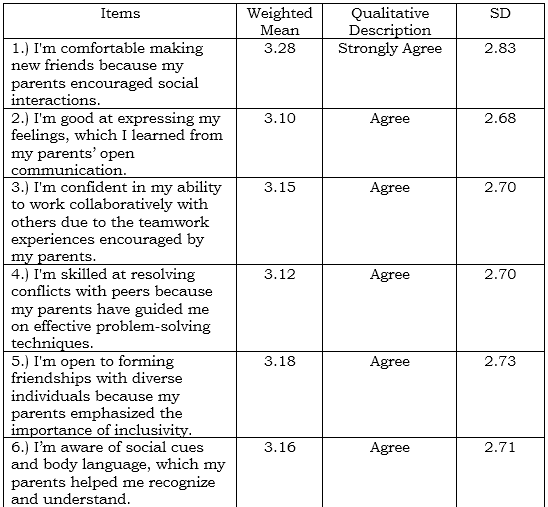
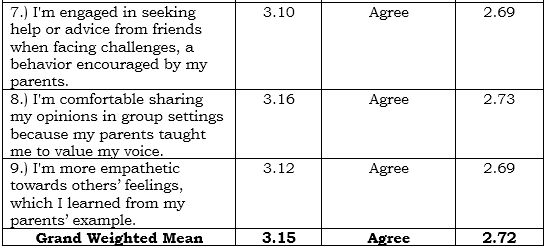
Legend: 1.00-1.49 strongly Disagree, 1.50-2.49 Disagree, 2.50-3.49 Agree, 3.50-4.00 Strongly Agree, SD-Standard Deviation
CHAPTER 5
Summary, Conclusion, and Recommendation
This chapter presents the summary of findings, conclusions, and recommendations of the study.
SUMMARY OF FINDINGS
1.) HUMSS 11 Senior High School Students on Influence of Authoritative Parenting on Student’s Self-Perception and Confidence.
The findings showed that respondents agreed on Influence of Authoritative Parenting on Student’s Self-Perception and Confidence with a grand weighted mean of 3.15 (SD=2.27).
2.) HUMSS 11 Senior High School Students on Different Parenting Styles on Social Skills.
The findings showed that respondents agreed on Different Parenting Styles on Social Skills with a grand weighted mean of 3.15 (SD=2.27).
3.) A program or a seminar on how to improve the personality development of students and to assess the impacts of parenting styles, such as addressing its hindrances that regress their growth in self-perception, confidence, and social skills.
The researcher proposed a seminar to enhance the Personality Development of Grade 11 HUMSS students in Nasugbu East Senior High School.
CONCLUSIONS
Based on the findings of the study, the following conclusions are drawn:
1. Respondents agree with their influence of authoritative parenting on their self-perception and confidence.
2. Conducting a seminar is proposed to improve the Personality Development of the Grade 11 HUMSS Senior High School students.
RECOMMENDATIONS
Based on the proceeding findings and conclusions the following recommendations are offered by the researchers:
1. Encourage an open communication between the parent and the child, as this can help them to gain encouragement and support.
2. Teachers and parents should foster an environment where students are able to express their self-perceptions and to develop their social skills.
3. Guide the child in learning how to deal with making decisions and practicing autonomy, as this can help them to improve their personalities and growth.
BIBLIOGRAPHY
Aziz, M., Khan, W., Amin, F., & Khan, M. F. (2021). Influence of parenting styles and peer attachment on life satisfaction among adolescents: Mediating role of self-esteem. The Family Journal, 10664807211009807.
Bahreini, M., Ravanipour, M., & Bagherzadeh, R. (2020). Investigating the relationships between mothers’ parenting styles and social skills of Primary school children. Iranian Journal of Pscyhiatric Nursing, 8(5), 97-107.
Cuncic, A., MA. (2023, March 13). “What is a neurotic personality?” Verywell Mind. https://www.verywellmind.com/how-neuroticism-affects-your-behavior-4782188
Dovetail Editorial Team. (2023, February 5). Descriptive research: design, methods, examples, and FAQs. https://dovetail.com/research/descriptive-research/
Furnham, A. (2017). Agreeableness. In: Zeigler-Hill, V., Shackelford, T. (eds) Encyclopedia of Personality and Individual Differences. Springer, Cham. https://doi.org/10.1007/978-3-319-28099-8_1200-1
Garcia, Q. P., & Santiago, A. B. B. (2017). Parenting styles as correlates to self-esteem of underprivileged adolescents: basis for a proposed parenting skills program. Parenting, 2(5), 27-35.
Gillette, H. (2024, May 24). “How to Overcome Low Self-Efficacy and Increase Belief in Yourself.” Psych Central. https://psychcentral.com/health/self-efficacy
Gordon, S. (2023, December 14). “What is conscientiousness?” Verywell Mind. https://www.verywellmind.com/how-conscientiousness-affects-your-behavior-4843763
Johns, M. (2024, August 21). “Openness personality trait.” Thomas International. https://www.thomas.co/resources/type/hr-blog/openness-personality-trait#:~:text=Openness%20is%20how%20open%2Dminded,on%20a%20few%20specific%20interests.
Kilonzo, P. M. (2017). “The impact of parenting styles on personality dimensions of adolescents in public secondary schools: A case of Mombasa County, Kenya.” International Journal of Education and Research, 5(7), 263-276.
Kuppens, S., & Ceulemans, E. (2019). Parenting styles: A closer look at a well-known concept. Journal of child and family studies, 28(1), 168-181.
Lang, D., & Diener, M. L. (2020). Influences on Parenting. Iastate.pressbooks.pub. https://iastate.pressbooks.pub/parentingfamilydiversity/chapter/influences-on-parenting
Mahapatra, S., & Batul, R. (2016). Psychosocial consequences of parenting. Journal of Humanities and social science, 21(2), 10-17. Metwally, S. (2018). “THE RELATIONSHIP BETWEEN PARENTING STYLES AND ADOLESCENTS’ PERSONALITY TRAITS.” Mansoura Nursing Journal, 5(2), 37-51. doi: 10.21608/mnj.2018.149700 MSEd, K. C. (2023b, November 24). The Psychology of personality development. Verywell Mind. https://www.verywellmind.com/personality-development-2795425
Nderitu, E. W. (2018). Influence of parenting styles on pre-school children’s social emotional skills development in Gituamba Division, Laikipia County, Kenya (Doctoral dissertation).
Parenting styles. (2017b, June 9). https://www.apa.org. https://www.apa.org/act/resources/fact-sheets/parenting-styles
Rao, M., & Wang, H. (2023). The Relationship Between Parenting Styles and Adolescents’ Academic Achievement. Journal of Education, Humanities and Social Sciences, 22, 753-757. https://doi.org/10.54097/ehss.v22i.13355
Rekha, S. “Authoritative and authoritarian parenting with respect to emotional and social development of their children: An evidence based analysis.”
Sanvictores T, Mendez MD. “Types of Parenting Styles and Effects On Children.” [Updated 2022 Sep 18]. In: StatPearls [Internet]. Treasure Island (FL): StatPearls Publishing; 2024 Jan-. Available from: https://www.ncbi.nlm.nih.gov/books/NBK568743/
Sembiring, T. B., Yusuf, S. R., Sudarmanto, E., & Murthada, M. (2023). The Influence of Parenting Patterns, Self-Perception, and Social Support on the Emotional Well-Being of Adolescents in Indonesia. The Eastasouth Journal of Social Science and Humanities, 1(01), 10-18.
Seyrdowleh, G., Barmas, H., & Asadzadeh, H. (2021). Comparison of pupils’ social skills and assertiveness with parenting styles. International Journal of Education and Cognitive Sciences, 1(4), 22-27.
Sitorus, N. S., & Nurhafizah, N. (2023). The Influence of Parenting Styles on Early Childhood Social Skills. AL-ISHLAH: Jurnal Pendidikan, 15(2), 2367-2374. Trautner, T. (2017, January 19). Authoritarian parenting style. MSU Extension. https://www.canr.msu.edu/news/authoritarian_parenting_style#:~:text=Authoritarian%20parenting%20is%20extremely%20strict
Wright, A. (2024) “Cultivating the Ability to Relate After Relational Trauma.” Psychology Today. https://www.psychologytoday.com/us/blog/making-the-whole-beautiful/202402/cultivating-the-ability-to-relate-after-relational-trauma#:~:text=Maladaptive%20behaviors%20are%20actions%20or
Yaoyao, F., Abd Hamid, J., & Tham, J. Parenting Factors affecting Parent-Child Attachment and Young Children‘s Autonomy towards Young children self-confidence in Jiangxi Province, China.
Zheng, Q. (2023). The Relationship between Parenting and Personality Development of Adolescents. Lecture Notes in Education Psychology and Public Media, 6(1), 115–124. https://doi.org/10.54254/2753-7048/6/20220192